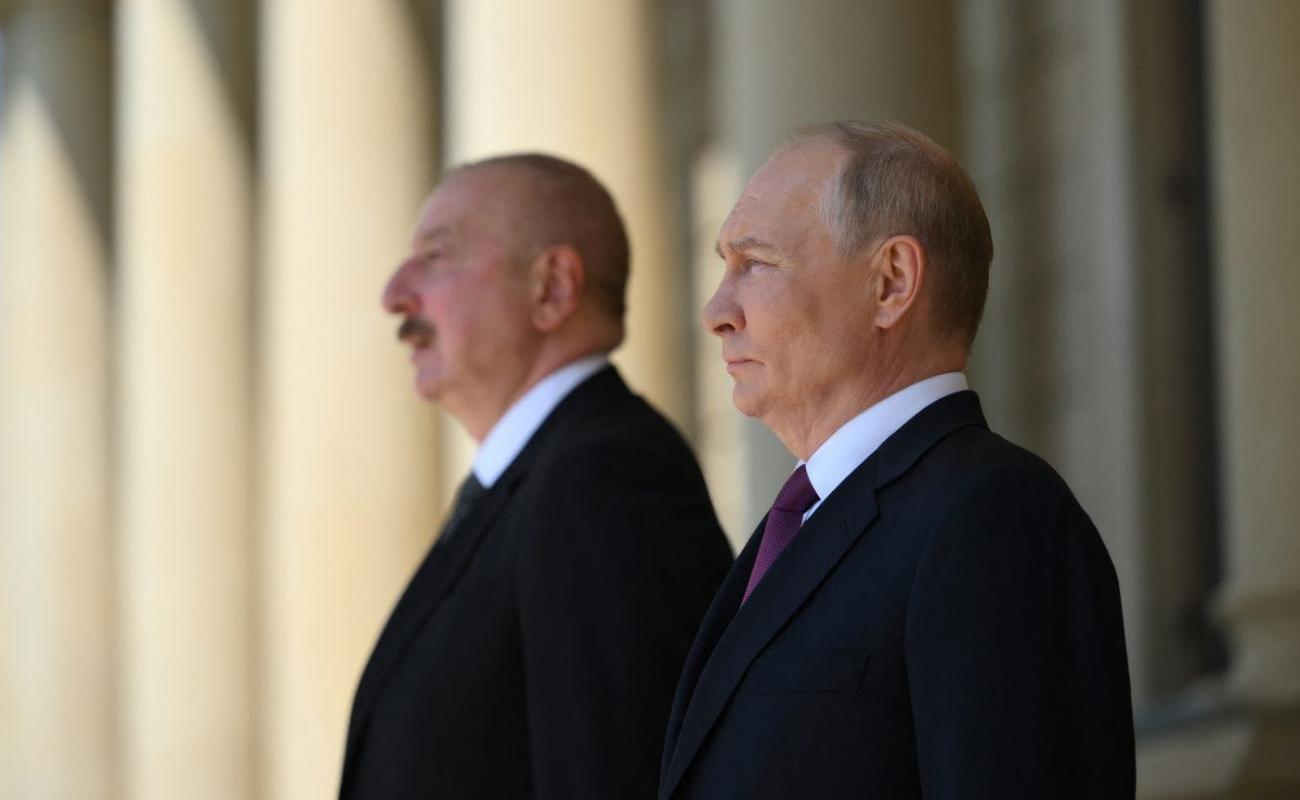Putin Seeks to Solve His Azerbaijan Problem

Azerbaijani President Ilham Aliyev met his Russian counterpart, Vladimir Putin, in Tajikistan on October 9. Their meeting, after many months of outright hostility, was interpreted by many as a signal of rapprochement, and with some reason.
Distrust will nevertheless persist — Azerbaijan considers itself a significant regional power better off when it is free of the Kremlin’s policy shackles. And there’s not much Russia can do about it.
The talks centered on what Putin described as the “most sensitive issue” — the December 2024 shooting down by a Russian missile battery of an Azerbaijan Airlines Embraer 190, with the deaths of 38 people. Putin expressed condolences and, in effect, issued an apology by belatedly accepting that the cause of the crash was indeed the Russian military.
The Russian president has argued that the investigation into the tragedy had concluded, that the incident was triggered by the presence of three Ukrainian drones over Russian territory at the time, and that the missiles did not directly hit the aircraft, but detonated roughly 10 meters (about 30ft) away. He did not mention that this is precisely the aim of many anti-aircraft missiles, and more than enough to inflict catastrophic damage.
This meeting ended almost a year of at times highly acrimonious political exchanges between the two countries. Indeed, bilateral tensions had been escalating prior to the tête-a-tête in Dushanbe. In June, for instance, Russian authorities detained several Azerbaijani nationals in Yekaterinburg, accusing them of involvement in murders dating back to the early 2000s. Two suspects reportedly died in custody.
In retaliation, Azerbaijan detained eight Russian citizens on charges of drug trafficking and cybercrime. It also shut down the Russian House, a self-described cultural organization, and detained the director and editor-in-chief of Sputnik Azerbaijan. The two agencies are closely linked to Russian propaganda output. In addition, all Russia-related cultural activities were cancelled.
Putin’s remarks in Dushanbe were interpreted by state media in Baku as a gesture of reconciliation, suggesting that Azerbaijan is open to restoring ties with Moscow. However, this move is guided less by sentiment than by pragmatic calculation. Despite being entangled in the war in Ukraine, Russia remains a formidable regional power capable of exerting economic and military pressure.
Azerbaijan, situated between Russia and Iran, remains vulnerable to external coercion and to instability stemming from the Middle East amid mounting Israeli and US pressure on Tehran (it has close ties to both countries).
Azerbaijan is cognizant of the potential danger Russia can still pose, both economically, militarily, and through its always-active spy agencies. It’s true that its alliances, including Israel as mentioned, but more importantly with Turkey, are a powerful deterrent to Russian overreach, but that is not enough to completely ward off Moscow.
The country, therefore, has good reason to seek an accommodation. This is especially true given that the two countries have some common interests. One is transcontinental trade, namely, the route from the Russian hinterland to Iran and the Indian Ocean, which runs through Azerbaijan. The International North-South Transport Corridor (INSTC) has gained in significance after Russia’s all-out invasion of Ukraine, and Western countries imposed major sanctions on the Russian economy.
The Kremlin began looking southward to Iran, both because of its extensive experience evading Western restriction and because it provided access to a warm-water, Asian port to ease pressure on its economy. Closer ties with Middle Eastern countries, part of its bid to become an ally of the so-called Global South, are now critical for Moscow.
Trade between Russia and Azerbaijan, too, is growing, as are bilateral investments. Moreover, Russia has many businessmen of Azerbaijani origin who have grown increasingly powerful and consistently lobby for pro-Baku policies. They also possess businesses with very significant Russian revenues of around $50bn across Russia.
Azerbaijani core foreign policy remains much the same. It undertakes a balancing act — preserving flexibility between powerful neighbors and preventing any single country from gaining excessive leverage.
At the same time, the region’s longstanding primary power, Russia, is weaker than it was thanks to its war of aggression against Ukraine. This widens the areas where Azerbaijan can exercise autonomy and allows a broadening of relationships with others, including China, the EU, the US, Israel, and wealthy Arab States.
Russia was surprised by the harsh Azerbaijani backlash to actions that would once have been accepted as the price of doing business with the Kremlin. There now seems to be a willingness on the Russian side to de-escalate, but if one thing is clear from the past year, it’s that the Azerbaijani leadership has no intention of accepting satellite status.
